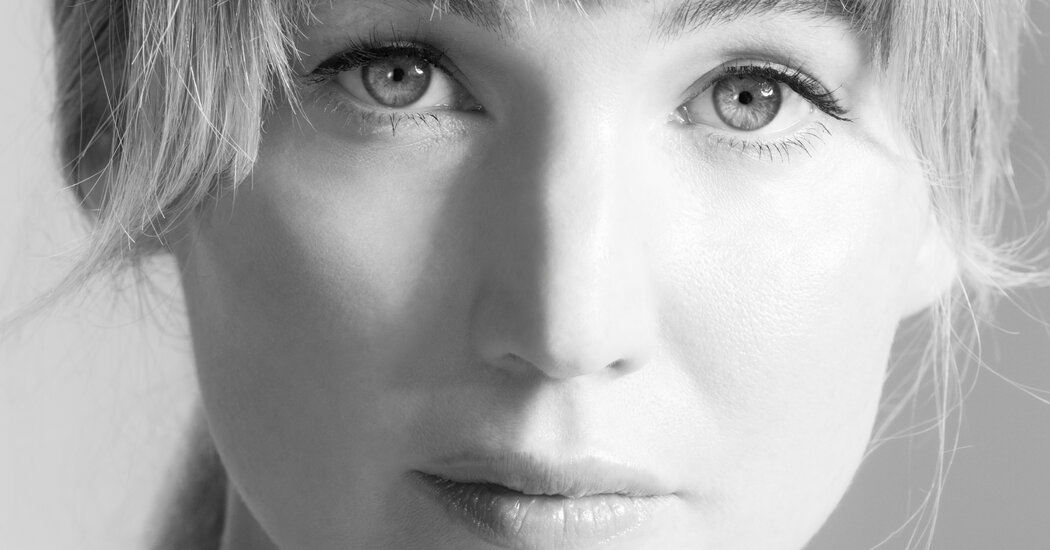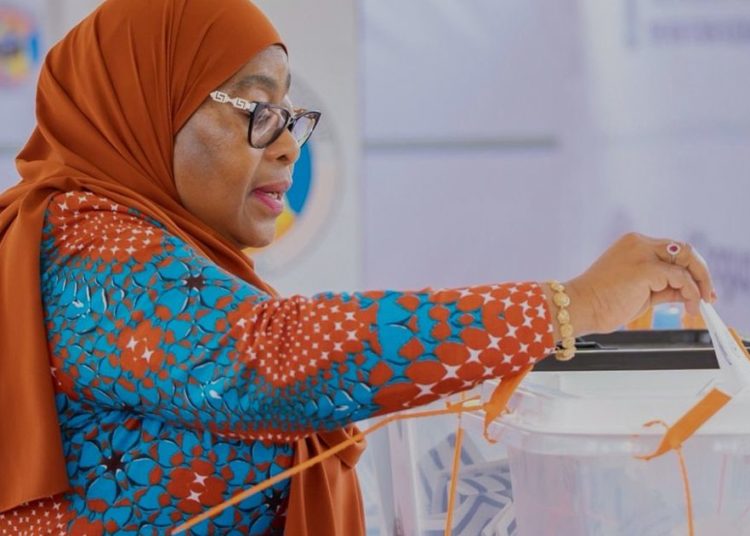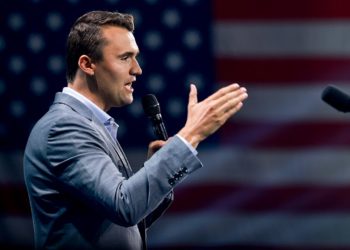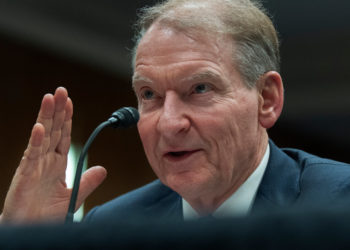At 35, Jennifer Lawrence has already been through several phases of Hollywood celebrity. She had a heady start to her career, breaking out in the indie film “Winter’s Bone,” starring in two huge franchises — “The Hunger Games” and “X-Men” — and winning an Oscar for “Silver Linings Playbook,” all by the age of 22. Critics praised her performances in subsequent films like “Mother!” and “American Hustle,” and off camera it seemed the public couldn’t get enough of her offbeat humor and outspoken persona. But privately, Lawrence told me, she was waiting for the backlash. It came in waves of negative attention and headlines about how she was too much — too brash, too unfiltered or, worse, a fake.
So, in 2018, Lawrence took a step back from acting, fired her agency and did some soul-searching. She got married, had two children and took some time to think and read. And now, as I found when I sat down with her, she is demonstrably different. Still funny and sharp, but clearly shaped by the love-you-then-hate-you cycle of fame.
We talked in advance of her new film, Lynne Ramsay’s “Die My Love,” in which she plays a young mother losing her mind in rural Montana. Lawrence told me her character, Grace, brought up a lot of complicated feelings because of her own struggles with postpartum symptoms after the birth of her second child. We also spoke about how those early years in Hollywood affected how she moves through the world today.
Subscribe: Apple Podcasts | Spotify | YouTube | Amazon | iHeart
“Die My Love” was adapted from a book by Ariana Harwicz, and Martin Scorsese was the one who wanted you to play this role after he read the book in his book club. When he reached out, what did he say? It was very complimentary, so I would be remiss to repeat it. But he said that I should read it. I had just had my first baby, so it was really overwhelming. I read it in one sitting. I was actually in a really good place in my postpartum journey. I didn’t struggle in the kind of classic postpartum way. I bonded right away with my son, and so I think because of that I was able to allow my mind to go to those darker places. If I had been in a dark place and read it, I would have been too afraid of it.
Who is in Marty Scorsese’s book club? [Laughs] I don’t know. I could just ask. The worst he could say is “I don’t feel like telling you.”
The film seemed to me like this scream against the current elevation of domestic life and perfect motherhood as the pinnacle of female achievement. What is it about for you? It morphs for me. It’s definitely about somebody losing her identity in motherhood and rage at not just her husband, but the change of the relationship, the change of the love.
How do you view what Grace, your character, is going through? I’ve read reviews that say she has postpartum depression. I’ve read reviews that say she’s bipolar. I’ve read reviews that say she has psychosis. Does it matter? And how did you understand what she was experiencing? It’s another thing that morphed for me and never really felt like one thing. I was pregnant [with my second] when I was filming this. There were certain realities that I just couldn’t look at. I spoke to a postpartum specialist who told me that a No. 1 cause of death in mothers in the first year is suicide. And that obviously went into our thinking about the ending, the forest. What is the forest? What is the fire? Do they find their way back to each other? What does all of it mean? I think I saw the forest as more of a cleansing.
We should say at the end she walks into this burning forest. Are we supposed to do this? Am I gonna, like, ruin the movie for everybody?
You brought it up! I guess I have franchise paranoia, but maybe it’s fine.
I think there’s not going to be a franchise of this film, but who am I to say? [Laughs] I would agree with you.
At any rate, she is someone who is very —— She’s really depressed. She’s really unhappy. She’s really angry. And I think the love that you have for your child — she felt like she was the only thing wrong with her baby, and that she was the only thing that could ruin her child. When I watched it back after having my second child and actually experiencing postpartum depression, that was a really, really weird experience.
Can you talk to me a little bit about what that postpartum depression looked like for you? I felt like a tiger was chasing me every day. I had so much anxiety. I had nonstop intrusive thoughts that I was at the whim of. They controlled me.
Fear about your child? Fear about yourself? It was fear about my child, just picturing every worst-case scenario, and then doubting everything that I was doing. I was already in therapy, but I got on a drug called Zurzuvae and I took it for two weeks and it really helped. So if anybody’s having postpartum: Zurzuvae. I’m not paid by them, but they could maybe throw me something.
Other than that time of postpartum depression, have you struggled with mental health issues that helped you understand the character a little better? I’ve struggled with anxiety for most of my life, and anxiety’s close friend is normally depression because by the end of the day you’re so exhausted from the adrenal burnout that you just kind of plummet and get really sad. So I’ve struggled with that. I think more of what I brought is the feeling of never feeling like you’re doing it right. I live in guilt. Is this the right breakfast? Is this what we should be talking about on the way home from school? I’m always worried that I’m failing them. And I can keep myself from being swallowed by that because I know I’m a good mom and I know my kids are happy and I have a great husband and I have great support at home, so I can do a reality check and be like, Everybody’s OK, you’re just spinning. But Grace can’t, and so she really goes there. It was very easy for me to follow that spin down the drain.
The other thing she deals with is a loss of her creative self. As a mother, you can feel how your child seems to leech all of the energy, all of the motivation out of you. You just give it all to them. Was that something that you were able to connect with? Yeah. Having kids is sacrificial. It’s gratifying and it’s amazing and rewarding, but it’s not not sacrificial. I’d never had to say no to something before that I really wanted to do. I could just go do it. I do wrestle. It feels vain and selfish that I love being a creative person as much as I do. My kids and my family are more important, obviously, but they feel like an equal part of me. I would not be complete if I couldn’t make movies. I just wouldn’t.
When I had my son, my firstborn, I was like, Being an actress is the perfect job for being a hands-on mom! Now I’m realizing: That was Covid. So I’m reckoning with, How much is it OK to love this and not want to give it up? I definitely relate to that. I found the opposite problem with creativity. I had so much anxiety when my second was born that the only way I could escape was in stories and books, and in particular the American Revolution. I really lost myself in ideas. That’s always been how I digest feelings.
The American Revolution? Do tell. Well, I read this amazing book called “The Revolutionary” by Stacy Schiff. It’s about Sam Adams. The closest thing we can get to a crystal ball is history. We’re all fighting over what it means to be an American right now, and so I was interested in what the original Americans’ ideals were. What did they think they were getting away from, and what did they think they were creating?
I do want to talk about politics, but one more thing about the film: There’s a lot of unvarnished nudity in it. We have such a complicated relationship in this country with nudity and women, and I was wondering how you thought about that. I’m definitely not bothered by people that are bothered by nudity. They don’t have to see it, they can fast-forward. But I don’t really care about being judged in that way. There was this freedom of vanity because I’m pregnant and it’s my second. I was like, Oh, I’ll just be four or five months. I won’t even start showing until I’m like six or seven months. And that’s not true when it’s your second. I just had to let go of any kind of vanity. I sucked in as hard as I possibly could, but I wasn’t going to diet. I was pregnant. I couldn’t exercise. I was working. So there’s just this real freedom to it.
Did that feel good? Yeah. It feels nice. I mean, I do have moments where I’m like, What technically are the differences between me and a prostitute? But it doesn’t keep me up at night.
What? Well, I don’t think that there’s anything wrong with prostitution either.
I’m not saying that there is. It’s funny that your mind went there. Oh, I’m very good at attacking myself. I can find every angle. In fact I should do this interview.
What would you ask you? Oh, my god, it would be so sad. [Lawrence’s publicist comes into the room where the interview is taking place to ask Lawrence to adjust her jacket.] Oh, no, it means she didn’t like something. What’d I say? [Lawrence takes a break and then returns.]
Is everything OK? Yeah. I didn’t get yelled at. I just peed. I believe in freedom of the press.
I believe in freedom of the press, too, damn it. Reminds me of “One Battle After Another.” Talking about freedom, baby!
Your persona in the world has sometimes been viewed as too loud, too much. Looking back, what do you think about how you were perceived as you were coming up? Now that I’m in my 30s and a mom, I can see how young I was. When I meet a 23-year-old now, they’re children. As horrified as I am at some things — like an old interview or something, so cringe — I get it. I was young and nervous and defensive and awkward. I remember when I was nominated for “Silver Linings Playbook,” somebody was like: “Everybody loves you! What does that feel like?” I was like: It feels precarious. It’s going to come down. That’s just the nature of things. And then I fell getting my Oscar, and the next year I was waving to fans and I tripped on a cone and I remember being like: “[Expletive], that’s it. Nobody’s gonna believe that I fell two years in a row.”
Because after you tripped at the Oscars, people said that you faked it. Yeah. I didn’t. But everybody thought that meant everything that I did was fake and it was all a shtick. This is how it felt to me. That I got found out as this fraud.
You said that you felt as if other people had gotten sick of you, and that you had gotten sick of yourself. You had gotten sick of yourself: What did that mean? I just was sick of doing this. Doing interviews is really scary. I’m very blessed, I’m very lucky, I’m very grateful. But it’s terrifying. You finish an interview or you’re gearing up to release a film and you’re putting yourself out there to be picked apart. I was just so tired of being quoted and people talking about the quotes, so tired of seeing myself in that way. I needed a break from it. People needed a break from it. It was a mutual breakup.
What did you do during that period where you took a step back? I lived with my cousin for a little bit. Hi, cuz! We watched TV. I took my dog to Central Park. Then I fell in love.
I saw you at this press conference that you gave in Spain and you seem a lot more reserved than you used to be, more careful, more considered. Is that deliberate? I’ve also grown up. And yeah, I’m a lot more nervous about whatever I say publicly. I don’t want to give an interview that’s a bunch of sound bites and a word salad. I don’t think that’s interesting and it would feel so inauthentic and not like what I’m here to do. So I’m trying to strike that balance.
I want to ask you about your relationship with some of your directors. You have worked with directors who are known as being very difficult. For example, when you were making “Mother!” with Darren Aronofsky, you hyperventilated, tore your diaphragm and got medical attention. And then he made you film the scene again when you got back. How do you work with directors who demand that of you? I stay loose. David O. Russell really taught me. Because of David it’s never really mattered what the director’s methodology is.
Amy Adams, who was in Russell’s “American Hustle” with you, said: “Jennifer doesn’t take any of it on. She’s Teflon.” I didn’t, but I really felt like with David that was his way of communicating in a non-BS way. I never felt like he was degrading or yelling at me. If he didn’t like something, he was just like: “That was terrible. Looked like [expletive]. Do it better.” And that was a very helpful conversation. I’m not sensitive. I don’t know how you can be in this industry.
Well, Amy Adams said that she cried on set. When she talked about you being Teflon, she said that for her it was hard. Maybe he was harder on her than he was on me. I don’t know. I mean, yes, of course I’m sensitive. I’m really sensitive. I don’t know.
I was about to say, we’ve had this entire conversation about how sensitive you are. I’m so sensitive. I can’t believe I just said that. That reminds me, I had a conversation with a girl the other night. She was like, “Oh, I’m the middle child with two brothers.” And I was like, “I’m the middle child with two brothers!” And we talked about it passionately for five minutes. And then I was like: “I’m the youngest. I’m sorry.” [Laughs] I guess I don’t mean anything I say. Do you still want to continue interviewing me?
Absolutely. OK.
Maybe you’re less sensitive about acting? Yeah, I’m not sensitive about acting. I’m not competitive about acting. My husband is always amazed because I am so competitive. When we play tennis, I throw my racket, I scream, I rage. I can’t do a puzzle. I make eye contact with him when we’re brushing our teeth sometimes because I’m like: “I did it a little bit longer than you. Did you notice that?” So he finds it fascinating that I’m not competitive with acting. But I think it’s because I feel secure. So why would I get competitive? When it comes to the director, you need to have a visionary, and so I think it’s just working with a real artist that I can trust.
You’re about to do a film with Martin Scorsese. I don’t know if I trust him. He’s going to have to really prove himself to me.
In advance of working with a director like Scorsese, how do you prepare? I’ll probably do what I always do, which is panic and then try to get in touch with an acting teacher and then meet the acting teacher and then never see them again. That’s my process.
I’ll read, I’ll be prepared, I’ll memorize. Leonardo DiCaprio [who is in the Scorsese movie, too], we worked together on “Don’t Look Up,” and he’s somebody who knows when his character was born and what kind of cologne they wear. Leo in “One Battle After Another” is so serious in his commitment, and that’s what makes it hilarious. When I was working with Leo, I was just like, I gotta be doing whatever he’s doing. But Christian Bale changed me a lot, too, in “American Hustle.” I was 23 and very sensitive about getting embarrassed in front of the crew. I thought acting was embarrassing. And so I would make a point of not acting until I absolutely had to, at “action.” But then I would see Christian. When the crew started getting ready, the lights started getting ready, and it became clear we were going to start rolling soon, he would slowly start getting ready. I was like, That seems like a good idea and I should do that when I’m more mature and can handle people looking at me and being like, “Pshh, she’s acting.”
You mentioned “One Battle After Another.” Oh, my god. I saw it last night in 70-millimeter IMAX as God intended. It’s the most incredible movie I’ve ever seen in my entire life.
It’s also a film that speaks to this political moment in a very interesting and important way. And it’s a good idea. It’s not a bad idea.
What do you mean? A revolution.
You have been politically outspoken in the past. In the first Trump administration, you had a lot to say. I’m curious how you feel about speaking out now. I don’t really know if I should. During the first Trump administration, I felt like I was running around like a chicken with my head cut off. But as we’ve learned, election after election, celebrities do not make a difference whatsoever on who people vote for. So then what am I doing? I’m just sharing my opinion on something that’s going to add fuel to a fire that’s ripping the country apart.
I think I’m in a complicated recalibration because I’m also an artist. I don’t want to start turning people off to films and to art that could change consciousness or change the world because they don’t like my political opinions. I want to protect my craft so that you can still get lost in what I’m doing. And if I can’t say something that’s going to speak to some kind of peace or lowering the temperature or some sort of solution, I don’t want to be a part of the problem. I don’t want to make the problem worse.
Do you regret how you dealt with things before? Probably? I regret everything I’ve ever done or said. I’m going to take the zip drives out of all of these cameras when I leave. The second term feels different. Because he said what he was going to do. We knew what he did for four years. He was very clear. And that’s what we chose.
This interview has been edited and condensed. Listen to and follow “The Interview” on Apple Podcasts, Spotify, YouTube, iHeartRadio or Amazon Music.
Video by Tre Cassetta and Nickolai Hammar
Lulu Garcia-Navarro is a writer and co-host of The Interview, a series focused on interviewing the world’s most fascinating people.
The post Jennifer Lawrence Regrets Everything She’s Ever Said or Done appeared first on New York Times.




